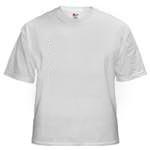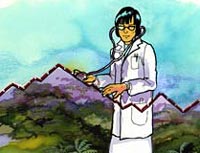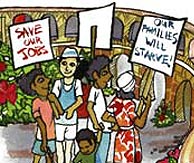| (insert your NIE or newspaper logo here) | Weekly Online LessonOnline Lesson ArchiveGrade Level: 8-12
|
World Trade's Balancing Act
 You might not think of T-shirt and underwear trading as an issue
that might cause global strife. But over the last few months, American
businessmen in the cotton clothing industry have found reason to pitch
complaints against China.
You might not think of T-shirt and underwear trading as an issue
that might cause global strife. But over the last few months, American
businessmen in the cotton clothing industry have found reason to pitch
complaints against China.
The sources of their complaints are some preliminary statistics showing that China has flooded U.S. markets with exports of cotton apparel over the last three months.
On Friday, April 8, 2005, the U.S. Office of Textiles and Apparel released data showing that imports of Chinese-made cotton knit shirts and blouses increased 1,250% during the first quarter from the same period in 2004. Plus, cotton trouser imports grew 1,500%, and underwear imports rose 300%.
Americans in the industry believe that this huge and sudden flood from China is severely disrupting the U.S. market, and they worry that if this trend continues they'll be pushed out of business completely.
The Committee for the Implementation of Textile Agreements (CITA), an interagency group chaired by the U.S. Department of Commerce, has vowed to study the issue and decide if a quota cap on these products should be negotiated.
Tracking and balancing the trading of goods is critical for economic growth and stability, on local, regional, national, and international levels - and that includes more than just T-shirts and underwear! Trading in goods is one way the world's wealth is distributed, and it often determines the economic lifestyles that can be had for different people in different places.
So this week, you're going to invest your time into learning more about how world trading works, how it can affect individual nations, and what role the International Monetary Fund (IMF) plays in helping keep the global economy fair and balanced.
Trading for a Better World
 To begin, go to IMF's EconEd
Online section, and watch the Inside
Money video.
To begin, go to IMF's EconEd
Online section, and watch the Inside
Money video.
How would you summarize Ruritania's economic challenges? If you were in charge, what possible steps might you take to boost the nation's wealth?
Now, let's check out The IMF in Action. First, let's explore the answer to the question, Why do we need the IMF?
How did you do as a phone dealer in Yak? What steps were necessary to reach your economic goals? What were some constraints you faced when making decisions?
Okay, so you understand why IMF helps the global economy, but What does IMF do to actually make positive changes happen? Try your hand as an IMF economist to find out.
What factors seemed to influence the nation's economy the most? In what ways did your team's research and analysis support IMF's recommendations? How did the country use those recommendations to improve the economy?
That nation wasn't too bad off, but what about countries who are already in dire straits? How can the IMF help in crisis?
What exactly is a "trade deficit"? What steps did you take to make your nation's exports more profitable? How did different groups of citizens react to suggested changes?
 In what ways did the IMF help your country recover from the crisis?
How exactly did the recommendations affect the nation's economy, both
in the short-term and long-term?
In what ways did the IMF help your country recover from the crisis?
How exactly did the recommendations affect the nation's economy, both
in the short-term and long-term?
Lastly on the IMF in Action page, find out - Who is the IMF?
How would the different backgrounds, specialty areas, and perspectives of these staff members help the IMF perform its particular roles in the global economy? In what ways does each person work with member countries? Why are different nations sometimes on different levels of economic development, and how might these factors influence how each country can grow and stabilize?
To test your new economic knowledge, let's get you on the Monetary Mania! quiz show.
Pick an avatar, then go head-to-head with the other two challengers - answering questions about money, monetary policy, and the IMF, and winning points for correct answers along the way.
How well did you score?
For an extended lesson, visit the U.S. Department of State to learn about How the U.S. Economy Works, which includes information and insights on this country's economic history, differences between small and corporate business, agriculture, industry, trade, and the government's role in economics.
Newspaper Activities
Watch issues of The Salt Lake Tribune, looking for stories about the U.S. economy, another nation's economy, or about trade between two or more countries. What factors seem to be the strongest forces influencing the situation? In what way is trade affecting the economy? What other factors - like drought or civil conflict - may be influencing the economy's health? Who are a few of the people in charge of making economic decisions? Do other experts generally approve or disapprove of their viewpoints and decisions? Is the IMF involved in any way? If IMF has made any analysis or recommendations, what are they? If you find a follow-up article related to the flood of textile imports from China, what exactly did Committee for the Implementation of Textile Agreements (CITA) conclude and what actions did they recommend? How did China react?
© Copyright 2005
Learners Online, Inc.
